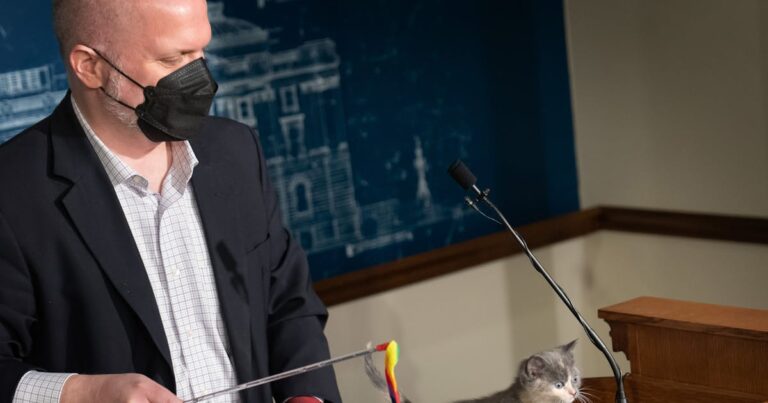On Wednesday, several state lawmakers advocating for greater transparency among commercial pet breeders in the state found themselves literally herding cats.
Rep. Mike Freiberg (DFL-Golden Valley) and Sen. Bonnie Westlin (DFL-Plymouth) said at a press conference that the House and Senate bills would require state inspection reports for large-scale dog and cat breeders. He said it would be made public. .
Special guests at the briefing included kittens Rima and Pinto (who briefly joined Freiberg on the podium) and German shepherd puppies Cupcake and Danish. All of these pets are candidates for adoption at the Animal Welfare Association.
“This is an opportunity to help consumers make informed decisions about the pets they bring into their homes,” Westlin said. “When a family brings a pet into their home, it's a big investment both emotionally and financially.”
The Minnesota Pet Breeders Association opposes the bill, saying it would expose business information that should be kept private.
“This is simply a call to all members of the public viewing licensed breeder websites to contact us. [the Board of Animal Health] “This is to obtain confidential information about the breeder's business. No other business is treated that way,” Elaine Hanson, the association's legislative affairs representative, said in an email.
Freiberg responded that the change would actually bring breeders in line with public data requirements for other licensed professions in Minnesota, such as accountants, doctors and barbers..
Under a law passed in 2014, dog and cat breeders who keep 10 or more unneutered animals and give birth to five or more puppies a year are subject to government supervision and approval. Small hobby breeders are not included.
But Freiberg said “last-minute legislative changes” made most of the information about these breeders secret. The only public information currently available is the name of the licensed breeder. There are over 100 in Minnesota.
Under the new bill, the three most recent inspection reports, the city or township where the breeder is located, and any trade names previously used by the breeder would be made public. It will also be made public whether the driver's license has been revoked. Anyone can request this information from the Animal Health Board.
Licensing information for nonprofit animal shelters is already publicly available under state law. Breeders who sell to pet stores are subject to inspection by the U.S. Department of Agriculture. Paul Sorenson of the Humane Society said the reports of these tests are publicly available, but many of the state's commercial breeders are excluded.
Sorenson said when it comes to state-licensed breeders, “we know of 47 violations in the last five years.” With the new bill, “we will be able to find out who committed the violation. Is it a repeat violation? Is it a record-keeping violation or a health and safety violation?”
But Hanson said breeders are concerned that shelters will start using the report to discourage people from buying animals from breeders. During the bill's first hearing in the Senate later Wednesday, she said the bill was aimed at “harassing and slandering pet breeders.”
During the same hearing, Sen. Gary Dahms (R-Redwood Falls) said the original provision to keep breeder information confidential was not suddenly added to the law in 2014, but rather that the company was unable to raise puppies or kittens with animal adoption agencies. He claimed that it was a compromise negotiated with people who
He questioned the latest bill and wondered if it was part of “a return to the kind of witch-hunts we've seen before.” [on] We will be following these breeders for several years, but some of the apples were of poor quality, so we want to examine all the apples. ”
Westlin said during the committee meeting that the bill's sole purpose is to provide more information to those who request it.
“There's no punishment here,” she said.
Freiberg and Westlin said they are confident the bill will pass this Congress. It has bipartisan support in both chambers.Republican Rep. Andrew Myers Republican Sen. Jim Abella and Assistant Minority Leader Karin Housley are co-authors.


